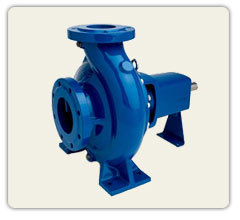Related Resources: pumps
End Suction Pumps
End Suction Pumps
 |
End suction pumps are one of the most common types of centrifugal pumps. They are almost always single stage pumps, and one of the most cost effective types of centrifugal pumps. Manufacturers provide a range of materials of construction, sizes, and designs for applications involving water at ambient temperature, abrasive slurries, high pressure and high temperature viscous oils, and corrosive chemicals.
End suction pumps usually have one impeller and a volute type casing. They work when the pumped liquid increases velocity as it moves along the vanes of the impeller; then the liquid moves into the volute casing, where a diffusion process converts the high velocity to high pressure.
Most are driven by an A.C. electric motor, though D.C. motor driven pumps are available. Other options include hydraulic motors, diesel engines, steam turbines and gasoline engines.
End suction pumps come in two configurations: a frame-mounted pump, in which the pump has its own set of bearings and a coupling separating the pump and motor; and a close-coupled, meaning the pump impeller attaches directly to the driver shaft with no separate coupling between them; and end suction pumps are used in several types of industrial, commercial and even residential applications. They are often priced competitively because they are readily available from many pump suppliers.
Standard water pumps are typically close-coupled and constructed with plastic or standard iron. For some heavy industrial applications, the end suction pumps are mounted on a bedplate with a coupling separating the pump and motor. These are often available in stainless steel or more exotic alloys, or plastics for corrosion resistance. The hardened iron options are ideal for slurry applications in dredging, minerals processing and mining.
Once fitted with open impellers for potential solids handling, end suction pumps can also be used in chemical or food processing applications. A closed impeller option would be used for relatively clean water and oil services. The pump shaft can be sealed from the environment in a variety of ways. And the end suction pumps may be designed to specific standards such as the ANSI B73.1 standard for chemical pump services or the API 610 hydrocarbon processing standard.
Written by PumpScout staff.